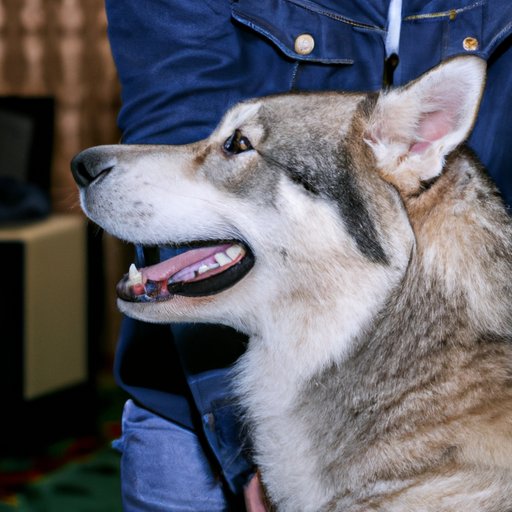
Introduction
In the wild, wolves are apex predators and fierce hunters. They are social creatures and form strong bonds with their pack members. Native to North America, Europe, and Asia, wolves have a reputation for being fierce, yet they are often revered and admired for their beautiful appearance and intelligence. However, these traits are not enough to make them suitable domestic pets.
Why Owning a Wolf as a Pet is a Bad Idea
Wolves are wild animals and have behaviors that are drastically different from those of domesticated pets. They are strongly territorial and require plenty of space to roam around and exercise. They also have a complex social hierarchy that they adhere to, and dominance plays a significant role in wolf behavior. In addition, wolves have heightened senses that allow them to detect prey from long distances, which often leads to howling, barking, and destruction in a domestic setting.
The Dangers and Risks of Keeping a Wolf as a Pet
There are serious dangers and risks involved when it comes to keeping a wolf as a pet. Not only does it put the owner in physical danger, but it can also put other household pets and members of the community at risk.
Physical Risks to Owners Themselves
Wolves are strong and powerful animals that can weigh up to 170 pounds. Their strength, coupled with their territorial nature and sharp teeth, creates a potent combination that can be disastrous for any novice owner. Even wolves that are raised in captivity still possess their wild instincts and are not predictable. Additionally, wolves can transmit diseases such as rabies and mange.
Dangers to Other Household Pets
Wolves are territorial animals and may see other pets in the home as a challenge to their dominance. Even a slight change in behavior can trigger aggression in wolves, leading to serious injury or even death for other pets in the home.
Threat to the Community
Wolves are also social creatures and thrive in the company of other wolves. Attempting to keep them in isolation in a domestic setting can lead to severe stress and agitation, making them more dangerous to those around them. Additionally, a wolf that escapes from its enclosure can cause serious harm to members of the community.
Legal Considerations for Owning a Wolf as a Pet
The legality of owning a wolf as a pet varies depending on the state and country. In general, owning a wolf as a pet is illegal in many states and requires special permits and licenses in others. Violation of these regulations can result in serious consequences such as fines or even imprisonment. It is essential to research the laws and regulations of the state where you reside before considering owning a wolf as a pet.
Alternatives to Owning a Wolf as a Pet
For those who desire the companionship of a pet but do not want to take the risks associated with owning a wolf, there are plenty of alternatives. Pets such as dogs and cats have been domesticated over thousands of years and are well-suited for a domestic setting. They are also much more comfortable to care for and require less space than wolves. Additionally, considering the ethical implications of keeping wild animals as pets, it is better to focus on conservation efforts to protect and preserve wildlife rather than owning them.

Understanding the Physical and Emotional Needs of a Wolf Before Considering it as a Pet
Wolves have unique physical and emotional needs that must be understood before considering owning one. In the wild, wolves live in large groups and engage in various activities such as hunting and socializing. It is vital to create an environment that mimics this behavior as much as possible while keeping them safe and secure. Additionally, providing a varied diet, ample space to move around, and mental stimulation is essential to meeting their needs.
Conclusion
Owning a wolf as a pet may seem appealing to some, but the reality is that it involves many risks and challenges. Wolves are wild animals with complex social structures and instincts that can lead to aggression and danger in a domestic setting. It is essential to understand the risks involved and legal issues associated with owning a wolf before considering one as a pet. There are many alternatives to owning a wolf that can provide companionship while minimizing the risks to both humans and animals.
Calls to Action for the Reader:
- Do your research before considering owning any wild animal as a pet.
- Support conservation efforts to preserve and protect wildlife.
- Consider adopting a domesticated pet that will be happier and healthier in a domestic setting.





